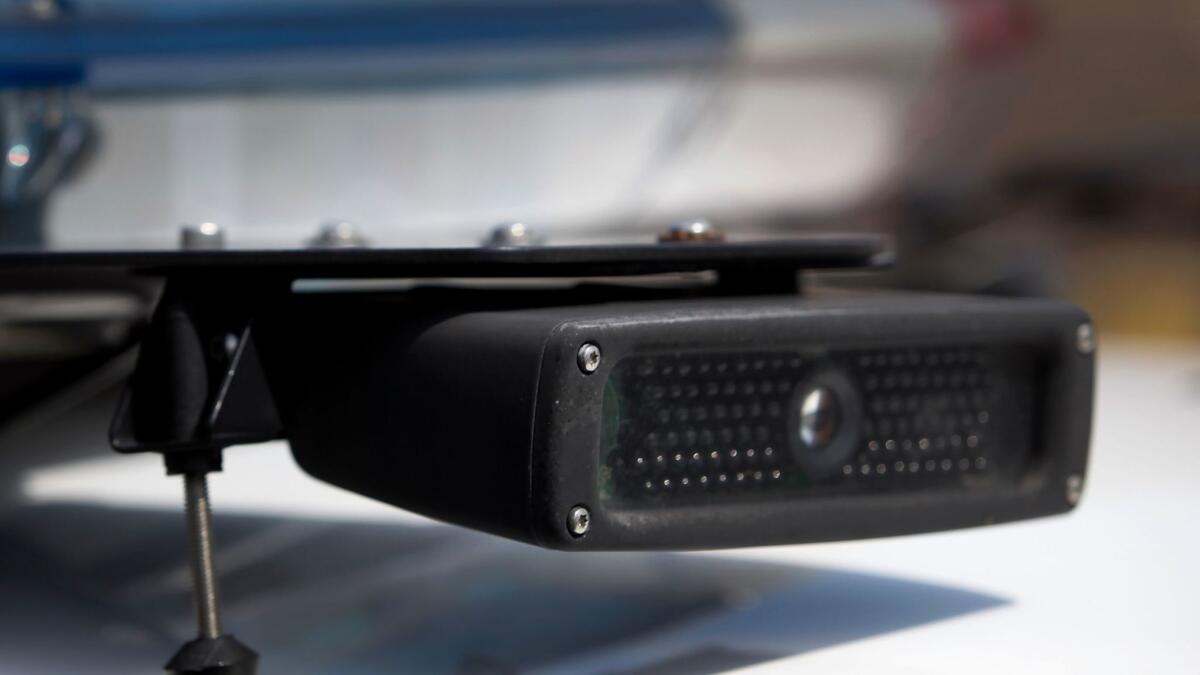California Supreme Court decision could end secrecy over police capture of license plate images

The California Supreme Court decided Thursday that data from millions of vehicle license plate images collected by the Los Angeles police and sheriff’s departments are not confidential investigative records that can be kept from public disclosure.
The unanimous opinion came as civil liberties groups raise concerns about the increasing use of police cameras mounted on cruisers or street poles to take photographs of passing vehicles. The devices use software to almost instantly compare the plates with vehicles linked to crimes and the information can be stored for years.
Law enforcement officials say the data are invaluable for tracking down stolen cars, catching fugitives or solving other types of crimes. But the American Civil Liberties Union Foundation of Southern California and the Electronic Frontier Foundation have criticized the indiscriminate nature of the surveillance and how the movements of innocent drivers are captured alongside potential criminals.
The latest legal dispute arose when the two groups sought data from about 3 million license plate images that the Los Angeles Police Department and the L.A. County Sheriff’s Department collected in a week. The organizations said they planned to analyze the data to determine if police were disproportionately capturing license plates in particular neighborhoods.
The Supreme Court stopped short of ordering the agencies to release the raw data, saying that doing so would violate the privacy of motorists whose licenses were captured. But the justices said there may be other ways to make the information publicly available by redacting some of the information or replacing each license plate number with a random unique identifier.
“It is an enormous win for disclosure and transparency,” said Peter Bibring, director of police practices for the ACLU of California. “The court recognized California’s sweeping public records exemption for police investigations doesn’t cover the mass collection of data.”
Dean Gialamas, director of the Sheriff’s Department’s Technology and Support Division, said the decision was the “best blend” because it protects the privacy rights of individuals.
“It is a win for privacy and law enforcement,” he said, noting that the agency did not want the individual personal information of each motorist to be public.
“What if someone had a stalker who got this information?” Gialamas asked. “The idea of redactions that the lower court will now consider is far better.”
The city attorney’s office did not respond to a request for comment.
The civil liberties groups submitted their requests in 2012. At the time, the LAPD gathered about 1.2 million images of vehicle plates a week while the Sheriff’s Department collected as many as 1.8 million, the Supreme Court said. The data are stored on confidential computer networks. The LAPD keeps its data for five years; the Sheriff’s Department keeps its for two.
The two departments declined to release the data, arguing that they were investigative records protected from disclosure.
But the Supreme Court disagreed, noting that the vast majority of the images were from vehicles not linked to any crime. The justices said at least some disclosure should be attempted.
“It is hard to imagine that the Legislature intended for the records of investigations exemption to reach the large volume of data that plate scanners … now enable agencies to collect indiscriminately,” the court noted. It pointed out that the scans are not gathered as part of a targeted investigation.
The court cautioned, however, that disclosing the raw data could help someone figure out where a motorist lives, works or frequently visits.
“The act of revealing the data would itself jeopardize the privacy of everyone associated with a scanned plate,” the court said, adding that with so many scanned images, the “threat to privacy is significant.”
The justices sent the case back to the trial court to consider whether the raw data can be redacted or turned over in another form that protects the identity of drivers.
Jennifer Lynch, a senior staff attorney with the San Francisco-based Electronic Frontier Foundation, said the court’s privacy qualms validate her organization’s concerns about police collecting huge volumes of data to track the movements of millions of people. Agencies could misuse the data to obtain personal information about department critics or target people based solely on their political activities, she said.
“Location data like this, that’s collected on innocent drivers, reveals sensitive information about where they have been and when, whether that’s their home, their doctor’s office, or their house of worship,” she said.
Twitter: @lacrimes
ALSO
L.A. sees surge in hate crimes during first half of 2017, data show
Terrorists, hackers and scammers: Many enemies as L.A. plans Olympics security
UPDATES:
7:20 p.m.: This article was updated with a comment from a sheriff’s official.
This article was originally published at 6:05 p.m.
More to Read
Sign up for Essential California
The most important California stories and recommendations in your inbox every morning.
You may occasionally receive promotional content from the Los Angeles Times.











